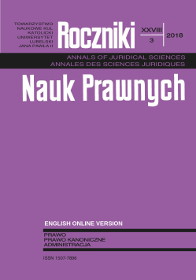Legal Requirements for Pious Dispositions of Will According to the 1983 Code of Canon Law
Legal Requirements for Pious Dispositions of Will According to the 1983 Code of Canon Law
Author(s): Paweł KaletaSubject(s): Law, Constitution, Jurisprudence, Canon Law / Church Law
Published by: Towarzystwo Naukowe KUL & Katolicki Uniwersytet Lubelski Jana Pawła II
Keywords: pious dispositions of will; acts inter vivos; acts mortis causa; trust for pious causes
Summary/Abstract: The article examines legal regulations concerning pious dispositions of will contained in the 1983 Code of Canon Law. The research problem, that is, identification of the legal requirements for a lawful acceptance of pious will, indicates that anyone can effect voluntary dispositions of property for pious causes (c. 1299, §1), if he has the capacity to perform acts in law, subject to canon 668, §5. The legislator distinguishes three ways of disposing of property for pious causes: inter vivos (e.g. by a donation agreement), 2. mortis causa (e.g. by a will and testament, a testamentary legacy, or legatum), and 3. through trust for pious causes (c. 1302). In adopting pious dispositions of will, not only canon law, but also civil law should be respected, without prejudice to the supervisory authority of the ordinary bishop expressed in canon 1301, §§1 and 3; canon 1302, §§1 and 2, and canon 1304.
Journal: Roczniki Nauk Prawnych
- Issue Year: 28/2018
- Issue No: 3EV
- Page Range: 201-219
- Page Count: 19
- Language: English

